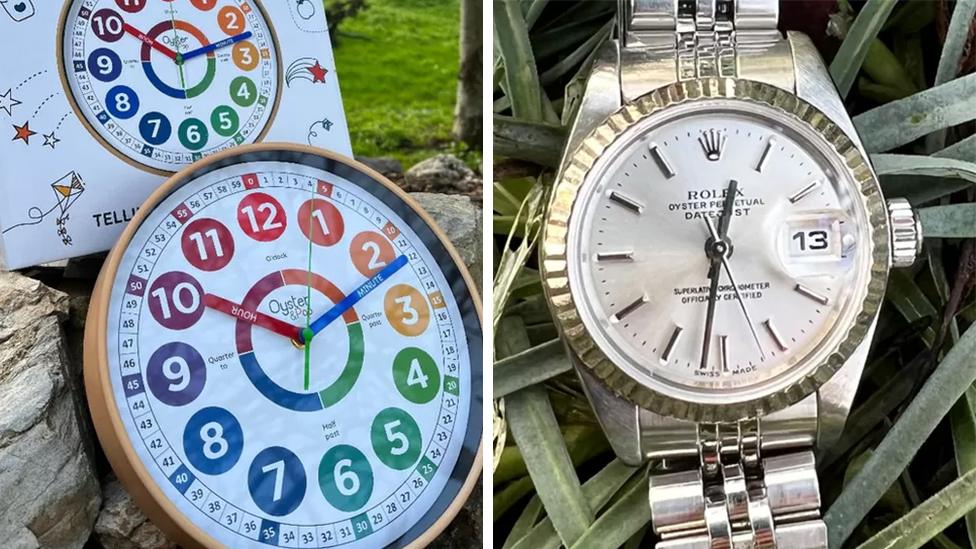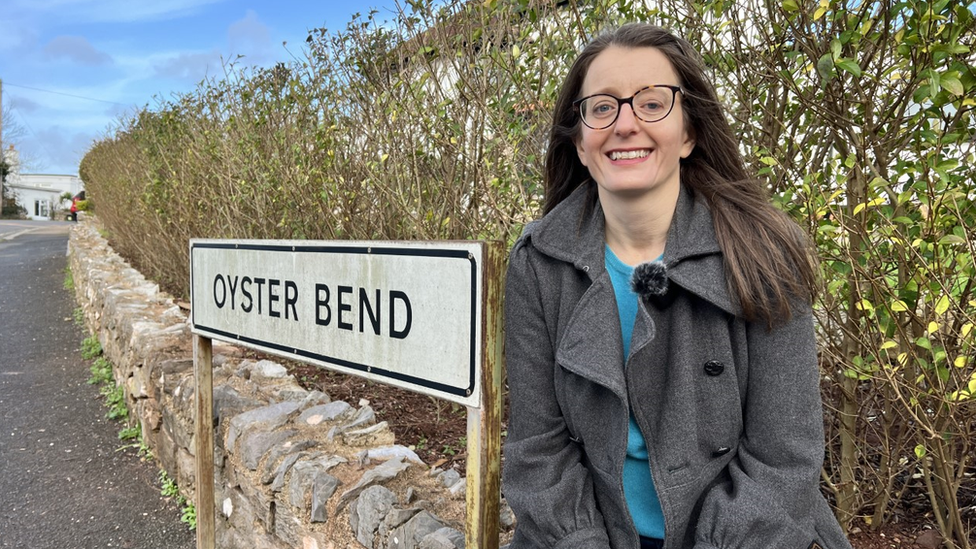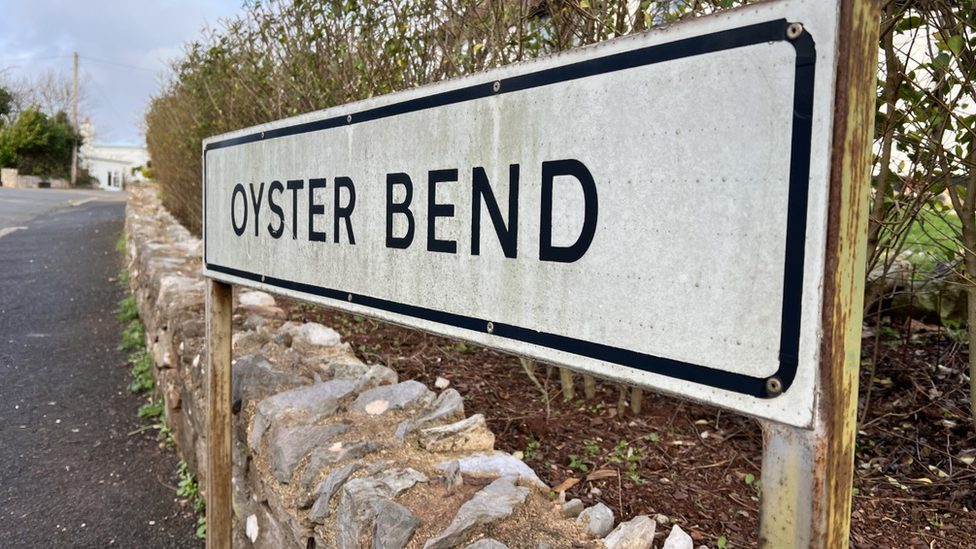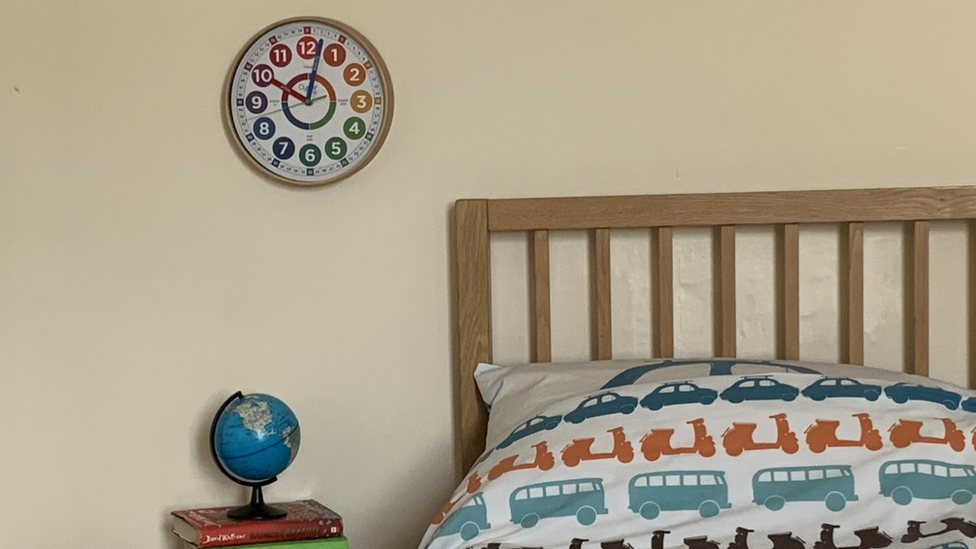Children's clock firm asked to rebrand by Rolex lawyers
- Published

The Oyster & Pop clock (L) and the Rolex Oyster Perpetual Datejust watch (R)
A children's clock business in Devon has received a letter from one of the world's biggest luxury watch firms asking it to rebrand.
Rolex lawyers have written to Oyster & Pop saying people would link the educational clocks with the brand's Oyster Perpetual watches.
Director of Oyster & Pop, Emma Ross-McNairn, said the situation was "nonsense" and that the lawyer's letters had been "bullish".
Rolex has been contacted for comment.

Sisters Emma Ross-McNairn and Sarah Davies are the directors of the firm Oyster & Pop
Oyster & Pop sell colourful wall clocks designed to help children learn to tell the time and retail at about £20.
Rolex is famed for selling high-end wrist watches including the Oyster Perpetual line and Submariner which retail for several thousands of pounds new.
Lawyers for Rolex, which according to Statista, has the largest market share of the Swiss luxury watch market, argued that the "average, reasonably well informed consumer" would likely call the Rolex line of watches to mind when looking at the Oyster & Pop logo.
They added: "Consumers will inevitably be misled into thinking that your products emanate from Rolex."
As a result the lawyers have demanded the firm change its logo, website domain and name to avoid further action.

Emma Ross-McNairn said she could not understand how people would link the her clocks to Rolex
Mrs Ross-McNairn said: "It would just crush our business.
"You see Formula One and Rolex sponsoring such huge events like that, you don't then think of a children's clock company.
"If someone says oyster to me, the first thing I think of is the Oyster Card on the tube, not Rolex watches.
"They've taken such a strong bullish stance. The letters from them have been disappointing and aggressive.
"I don't think anyone could confuse our clocks as coming from Rolex."

The sisters said they named their firm after Oyster Bend in Torbay where they grew up
Mrs Ross-McNairn started the business in 2020 when she was furloughed with her sister, Sarah Davies.
Since then they've gone on to sell the clocks online alongside other educational products including chores charts and fraction sets.
The 46-year-old explained that they named the firm after the road "Oyster Bend" where the sisters grew up in Torbay.
She said her firm had responded to Rolex with a nine-page letter highlighting reasons why the business felt the claims from Rolex were unjust.
The sisters had also offered to agree terms with Rolex - that they would never produce an adult watch and would never change the brand's name to just Oyster.

The expert view from Giles Parsons partner Browne Jacobson - intellectual property specialist
Are situations like this commonplace?
"These cases are quite common. This isn't unusual, major brands will regularly send out lots of these letters.
"99% of cases don't go through to hearing.
"Trademark oppositions are much more common than court proceedings, court proceedings are complicated and expensive and an awful lot of hassle. It's normally in the interests of both parties to settle beforehand."
What do the courts look for?
"The main thing is if someone has a registered trademark, you're looking to see if the sign that the alleged infringer is using is confusingly similar. What that means is - would somebody that saw the alleged infringed sign wonder whether or not there is a connection between the registered mark and the one that's being used and if somebody is wondering whether or not there's a connection, that's trademark infringement."
What should companies look out for?
"If you are launching a new company the courts have made it clear that you ought to be running trademark clearance search.
"Running a trademark clearance search can save you so much time and hassle."

Trademark battle
Rolex USA, which owns the trademark for 'oyster', has previously won a trademark battle against Oyster & Pop in the United States of America after the women applied for their own trademark under the clocks category.
Mrs Ross-McNairn said at the time her business could not afford to instruct attorneys in America to fight the brand and she was not legally allowed to represent herself in the country. As a result the request lapsed and the pair lost by default.

The Oyster & Pop clocks have been sold online in the UK and overseas
In documentation seen by the BBC, Rolex USA lawyers suggested the pair change their category filing from International Class (IC) 14 for clocks to IC28 Toys and Games.
They have since done so, but added that the lawyers later said this would not solve the problem.
Oyster & Pop now have until 30 January to file a defence and counter statement in response to the trademark application objection.
Rolex has been contacted for comment but is yet to respond.

Follow BBC News South West on Twitter, external, Facebook, external and Instagram, external. Send your story ideas to spotlight@bbc.co.uk, external.
Related topics
- Published13 May 2022

- Published8 August 2022

- Published24 May 2022

- Published30 April 2022

- Published25 April 2022
